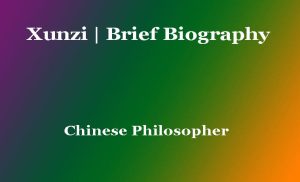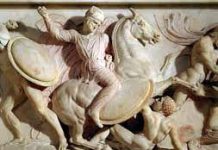Discover the comprehensive biography of Xunzi, a major Confucian philosopher of the Warring States period. Learn about his teachings on human nature, education, rituals, and governance that shaped Chinese intellectual thought.
Xunzi | Brief Biography
Xunzi was a Chinese philosopher who lived during the Warring States period (475-221 BCE) in ancient China. He was born around 312 BCE in the state of Zhao and lived until around 230 BCE. He was a Confucian philosopher who made significant contributions to the development of Confucianism as a dominant philosophical and political force in Chinese society.
He was a prolific writer, and his work covered a wide range of topics, including ethics, politics, metaphysics, and epistemology. He is most well-known for his book “Xunzi,” which is a collection of his essays and discourses on various topics. This book is one of the core texts of Confucianism and has been widely studied and interpreted over the centuries.
In his philosophy, Xunzi emphasized the importance of education and ritual in shaping human behavior. He believed that humans are inherently selfish and uncivilized and that it is only through education and ritual that they can be transformed into moral and virtuous individuals. He saw the role of the ruler as one of providing guidance and education to the people in order to create a harmonious and orderly society.
He also made significant contributions to the development of Chinese political thought. He believed in the idea of a strong centralized government, with the ruler having absolute power. He argued that this was necessary in order to maintain order and stability in society. He also believed that the ruler should be chosen based on merit and ability, rather than being inherited through bloodlines.
His views on human nature were quite different from those of his contemporary, Mencius. Unlike Mencius, who believed that humans are inherently good and that their moral nature can be developed through education, Xunzi believed that humans are inherently selfish and that it is only through education and ritual that they can be transformed into moral individuals.
In addition to his contributions to Confucianism and Chinese political thought, Xunzi also made important contributions to the field of epistemology. He believed that knowledge can be acquired through the senses and that it is possible to arrive at a correct understanding of the world through careful observation and analysis.
Despite his many contributions to the development of Confucianism, Xunzi was not widely recognized during his lifetime. It was only in later centuries, as Confucianism became the dominant philosophical and political force in Chinese society, that Xunzi’s ideas and writings gained widespread recognition and influence.
Today, Xunzi is regarded as one of the greatest Confucian philosophers in Chinese history. His ideas and writings continue to be studied and debated by scholars and students of Confucianism and Chinese philosophy, and his legacy continues to shape the development of Confucian thought and its influence on Chinese society. 0 0 0.
Comprehensive Biography of Xunzi
Early Life and Background
Xunzi (荀子), also known as Xun Kuang (荀況), was a prominent Chinese philosopher during the late Warring States period (475–221 BCE), an era marked by political turmoil, interstate warfare, and intense intellectual debates. He was born around 312 BCE in the state of Zhao, one of the seven powerful states vying for control during this tumultuous period. While the exact details of Xunzi’s early life are sparse, it is believed that he came from a relatively well-off family, allowing him access to the education that would shape his philosophical journey.
Xunzi lived through one of the most chaotic and intellectually dynamic periods in Chinese history. This backdrop of constant warfare, instability, and moral decay profoundly influenced his thinking. He saw the breakdown of society as a result of weak governance and flawed human nature, which would become central themes in his philosophy. His intellectual contributions would later play a significant role in shaping Confucianism’s evolution and Chinese thought for centuries to come.
Intellectual Career and Confucian Foundations
Unlike Mozi or Daoist thinkers of the time, Xunzi firmly identified with the Confucian tradition. He was a devoted scholar of Confucius’ teachings and believed in the need to restore order and harmony in society through education, ethical governance, and proper rituals. However, Xunzi is considered one of the most distinctive and original Confucian philosophers because he brought a realist perspective to Confucianism, emphasizing the role of human nature and the importance of institutional structures in shaping moral behavior.
Xunzi was active as a teacher and official in several states, most notably the states of Qi and Chu, which were major cultural and political centers at the time. His experience in politics and governance greatly informed his views on leadership and statecraft. Unlike Mencius, another Confucian philosopher of the era, Xunzi’s outlook on human nature and the role of government was far more pragmatic and stern.
Philosophical Contributions
Human Nature is Inherently Bad (性恶论)
Xunzi’s most famous and controversial doctrine is his belief that human nature (‘xing’) is inherently bad or selfish. He argued that humans are born with natural inclinations toward desire, self-interest, and conflict. According to Xunzi, individuals naturally seek to fulfill their own desires at the expense of others, leading to chaos and disorder if left unchecked. This pessimistic view of human nature starkly contrasted with Mencius’ belief that human nature is inherently good.
Xunzi believed that, without proper guidance and education, humans would devolve into conflict and corruption. Therefore, moral education, societal institutions, and rituals are necessary to cultivate individuals’ virtues and suppress their baser instincts. He saw the role of culture, particularly Confucian rites (‘li’), as essential in shaping human behavior.
The Role of Rituals (礼)
Central to Xunzi’s philosophy was the Confucian concept of ‘li’ (rituals or rites), which he believed were indispensable for governing both individuals and society. Xunzi argued that rituals and social norms were not mere formalities but essential tools for moral development and social harmony. By participating in rituals, individuals learn to discipline their desires, foster respect for others, and internalize social order. These rituals also serve to reinforce social hierarchies and the roles that different individuals play within a well-ordered state.
According to Xunzi, rituals act as a counterbalance to human selfishness, channeling people’s natural tendencies in ways that promote social harmony. For him, ‘li’ was a civilizing force that could mold an inherently flawed humanity into moral, cooperative beings.
The Importance of Education (教化)
Xunzi placed great emphasis on education as the primary means through which human beings could overcome their natural inclinations and achieve moral and intellectual excellence. He believed that moral education should be rigorous and structured, focusing on learning proper behavior, ethics, and the Confucian classics. Through education, individuals could cultivate virtues such as benevolence, righteousness, and wisdom, transforming their nature to fit societal ideals.
In Xunzi’s view, education was not just about acquiring knowledge but about the systematic cultivation of character. By studying the classics and participating in rituals, individuals learn to align their actions with societal expectations and higher moral principles.
The Role of Government and Leadership
Xunzi’s political philosophy was deeply intertwined with his views on human nature and moral education. He believed that good governance was essential for the moral development of the people and the stability of the state. According to Xunzi, rulers must be virtuous and knowledgeable, using their authority to set a moral example for their subjects. A well-ordered state is one where rulers and officials are selected based on their virtue and competence, rather than birthright or social status.
He also advocated for strong laws and institutions to maintain order, but unlike Legalists, who favored harsh punishments and strict enforcement, Xunzi saw laws as tools for cultivating virtue rather than merely suppressing bad behavior. Government, in his view, should function not just to control people but to educate them morally and ethically.
Comparison with Legalism and Daoism
Xunzi’s views were often compared to those of the Legalist school of thought, especially due to his emphasis on strict governance and law. However, Xunzi differed from Legalists such as Han Feizi and Shang Yang in that he believed laws should be used to cultivate moral virtues rather than simply to enforce obedience and prevent crime. For Xunzi, government was not only about maintaining order through punishment but also about guiding people toward a higher ethical standard.
Xunzi also rejected the Daoist emphasis on spontaneity and alignment with the natural world. While Daoists such as Laozi and Zhuangzi advocated for a life of non-interference and harmony with nature, Xunzi believed that human beings must actively transform themselves and their surroundings through discipline, learning, and culture.
Legacy and Influence
Xunzi’s works were highly influential during the Warring States period and continued to shape Chinese philosophy for centuries. His most famous work, ‘Xunzi’, a collection of essays, lays out his philosophical ideas on topics such as human nature, education, governance, and the role of rituals. His writings contributed to the intellectual debates of the time, particularly his opposition to Mencius’ more optimistic view of human nature.
Xunzi’s impact can be seen in the development of later Chinese philosophical traditions, including Confucianism and Legalism. His pragmatic and realistic approach to governance was influential in shaping the policies of the early Han dynasty, even though Confucianism, as championed by Mencius, eventually became the dominant ideology of imperial China. Xunzi’s ideas about education, ritual, and the importance of strong leadership continued to be referenced in debates about Chinese statecraft and society.
Decline of Influence
After his death around 230 BCE, Xunzi’s influence gradually waned, particularly as Confucianism became more closely associated with Mencius’ teachings during the Han dynasty (206 BCE – 220 CE). Mencius’ more positive view of human nature became the mainstream interpretation of Confucianism, while Xunzi’s more pessimistic and rigorous approach was sidelined.
Despite this, his philosophy remained a vital part of China’s intellectual history, especially in the legal and political spheres. Some Legalist thinkers, including Han Feizi, were influenced by Xunzi’s ideas about human nature and the need for strong governance, even though they ultimately developed harsher and more authoritarian philosophies.
Conclusion
He was a pivotal figure in the development of Confucianism and Chinese philosophy. His realist view of human nature, emphasis on ritual and education, and insights into governance and leadership made him one of the most important thinkers of the Warring States period. Although his influence was overshadowed by Mencius in later centuries, Xunzi’s teachings continue to resonate with scholars interested in ethics, politics, and human nature. His legacy remains an essential part of China’s rich intellectual tradition, representing a more pragmatic and disciplined strand of Confucian thought. 0 0 0
Xunzi (荀子): Brief Data
- Name: Xunzi (荀子), also known as Xun Kuang (荀況)
- Birth: c. 312 BCE, State of Zhao (modern-day China)
- Death: c. 230 BCE
- Era: Warring States period (475–221 BCE)
- Philosophy: Confucianism with a realist and pragmatic approach
Key Concepts:
- Human nature is inherently bad (xing e)
- Importance of education and rituals (li)
- Strong leadership and governance
- Influence on later Legalist and Confucian traditions
- Major Work: ‘Xunzi’ (collection of philosophical essays)
FAQs on Xumnzi
1. Who was Xunzi?
He was a significant Chinese philosopher from the Warring States period who contributed to the development of Confucianism. He is best known for his realist views on human nature, which he argued was inherently bad, and his emphasis on education and rituals as means to cultivate virtue and social harmony.
2. What was Xunzi’s view on human nature?
He believed that human nature is inherently bad and selfish. According to him, humans are born with desires and tendencies that, if left unchecked, lead to chaos and conflict. Therefore, he advocated for education and rituals to mold people into virtuous and morally upright individuals.
3. How did Xunzi differ from Mencius?
His view on human nature sharply contrasted with Mencius, who believed that humans are naturally good. While Mencius emphasized cultivating innate goodness, Xunzi argued that humans must be educated and disciplined through rituals and institutions to suppress their selfish tendencies.
4. What role did rituals (‘li’) play in Xunzi’s philosophy?
For Xunzi, rituals (‘li’) were essential tools for cultivating moral behavior and maintaining social harmony. He believed that rituals help individuals control their desires, respect social order, and internalize virtuous conduct, playing a civilizing role in society.
5. How did Xunzi view governance?
He believed in strong governance led by virtuous and knowledgeable rulers. He argued that government should not only enforce laws but also guide the people toward moral and ethical behavior. His ideas on leadership stressed the importance of education and morality in statecraft.
6. How did Xunzi influence later Chinese philosophy?
His ideas influenced both the Confucian and Legalist traditions. His realist views on human nature informed some aspects of Legalism, while his teachings on education and ritual continued to impact Confucian thought. Although overshadowed by Mencius in later Confucianism, his work shaped Chinese intellectual debates for centuries.
7. What are Xunzi’s major works?
His major work is a collection of essays titled ‘Xunzi’, in which he lays out his philosophical ideas on human nature, rituals, education, and governance. This work remains a critical text in Chinese philosophy.
8. Why did Xunzi’s influence decline after his death?
After his death around 230 BCE, Confucianism came to be dominated by Mencius’ more optimistic view of human nature. Although Xunzi’s ideas continued to influence certain legalist and political thinkers, his philosophy was eventually overshadowed during the Han dynasty by Mencius’ teachings.
N. B. This article originally belongs to the book, ‘Brief Biographies of Ancient Thinkers and Writers‘ by Menonim Menonimus.
Books of Biography by M. Menonimus:
- The World Writers-Brief Biographies
- Introduction to World Writers
- Introduction to World Personalities
- Love of Reputed Persons ..
Additional Searches:
- Famous Writers
- 9 Greek Philosopher
- Ancient Biography
- Ancient Greek Philosophy
- Japanese Philosophy
- Chinese Philosopher ….











